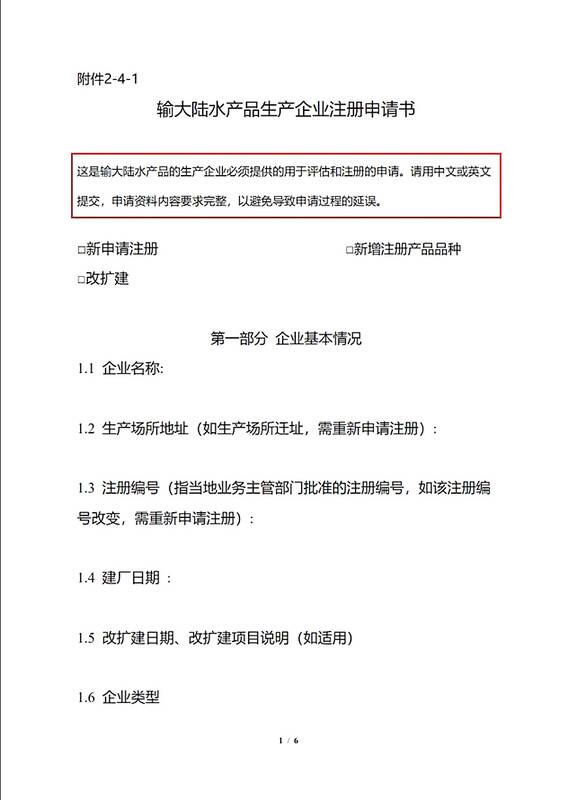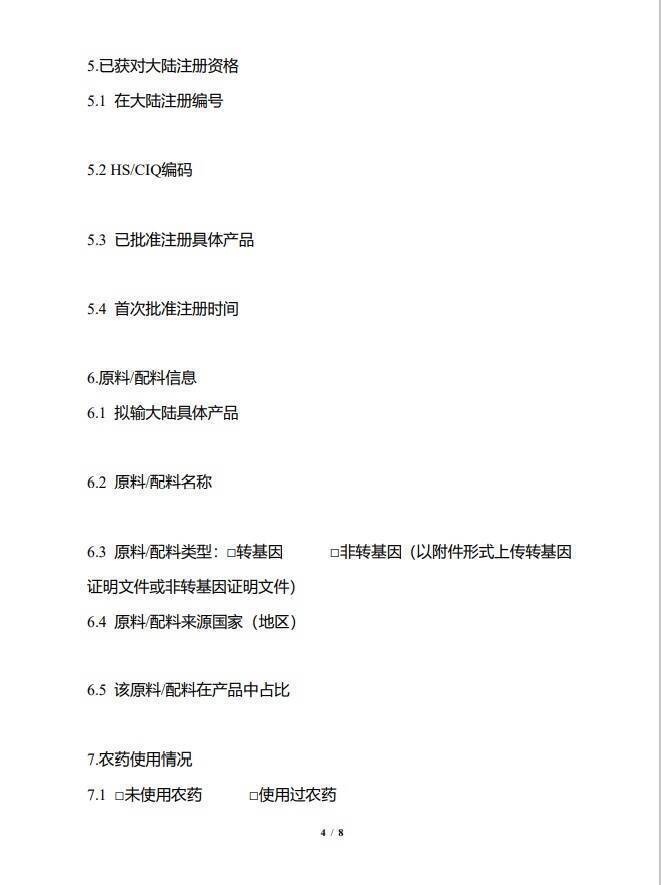The Food and Drug Administration (FDA) yesterday released 31 registration forms and inventory lists Beijing requires Taiwanese exporters to fill out before they can send their products to China, showing that some of them have to disclose the proportions of ingredients used in their products, as well as the cooking time and temperature.
China last week unilaterally suspended imports of many Taiwanese products, including seafood, alcohol and other beverages, affecting 2,409 companies.
The Chinese General Administration of Customs said the companies had submitted incomplete registration information.

Photo copied by Yang Yuan-ting, Taipei Times
Over the past few days, Chinese-language media have reported that several Taiwanese companies are not planning to submit additional documents to resume exports to China, and would instead seek to sell their products in other countries, as the Chinese forms require them to reveal trade secrets.
Among the banned food companies, a Taipei-based producer of pineapple cakes was reported as having given up on submitting additional data required by China. The report cited the company’s owner as saying that she did not want to reveal the proportions of ingredients used, the layout of her factory and other information.
However, the Chinese Nationalist Party (KMT) caucus and some Chinese-language media have criticized the Council of Agriculture and the FDA, saying they had failed to help the companies complete the registrations and questioning whether the information required in the forms really amount to trade secrets.

Photo copied by Yang Yuan-ting, Taipei Times
FDA Director-General Wu Shou-mei (吳秀梅) on Tuesday evening said it is reasonable for a customs agency to ask importers to disclose the ingredients of food products, but the Chinese government goes beyond what is reasonable.
She said Beijing informed the FDA on March 9 that it would require firms to fill out the new registration forms, with the information required depending on what type of products they seek to import.
The FDA respects the companies’ decisions on whether they want to disclose the required information, she said, adding that the decisions involve commercial considerations.
The forms require certain food companies to disclose the proportions of ingredients, as well as processing methods, factory layout and workshop floor plans, as well as other information, the FDA said.
Beijing unilaterally decided to ask companies to use the new forms, requiring them to disclose information “in written form,” which means on paper, the FDA said.
Beijing uploaded the forms to its online food export integration platform on March 18, it added.
Minister of Health and Welfare Hsueh Jui-yuan (薛瑞元) said companies based in other countries can submit the information online.
For them, the “ingredient proportion” field is optional, while the paper forms that Taiwanese firms must use does not mark any fields as optional, Hsueh said.
The FDA said that regardless of whether a Taiwanese producer independently seeks to export goods to China or another company is involved, the forms are the same.
The Chinese customs agency helps companies complete the forms, it added.
As of yesterday, 31 products under “recommended registration” and 824 products under “self-registration” had been approved by Beijing, the FDA said.
Additional reporting by CNA

DAREDEVIL: Honnold said it had always been a dream of his to climb Taipei 101, while a Netflix producer said the skyscraper was ‘a real icon of this country’ US climber Alex Honnold yesterday took on Taiwan’s tallest building, becoming the first person to scale Taipei 101 without a rope, harness or safety net. Hundreds of spectators gathered at the base of the 101-story skyscraper to watch Honnold, 40, embark on his daredevil feat, which was also broadcast live on Netflix. Dressed in a red T-shirt and yellow custom-made climbing shoes, Honnold swiftly moved up the southeast face of the glass and steel building. At one point, he stepped onto a platform midway up to wave down at fans and onlookers who were taking photos. People watching from inside

A Vietnamese migrant worker yesterday won NT$12 million (US$379,627) on a Lunar New Year scratch card in Kaohsiung as part of Taiwan Lottery Co’s (台灣彩券) “NT$12 Million Grand Fortune” (1200萬大吉利) game. The man was the first top-prize winner of the new game launched on Jan. 6 to mark the Lunar New Year. Three Vietnamese migrant workers visited a Taiwan Lottery shop on Xinyue Street in Kaohsiung’s Gangshan District (崗山), a store representative said. The player bought multiple tickets and, after winning nothing, held the final lottery ticket in one hand and rubbed the store’s statue of the Maitreya Buddha’s belly with the other,

‘COMMITTED TO DETERRENCE’: Washington would stand by its allies, but it can only help as much as countries help themselves, Raymond Greene said The US is committed to deterrence in the first island chain, but it should not bear the burden alone, as “freedom is not free,” American Institute in Taiwan Director Raymond Greene said in a speech at the Institute for National Defense and Security Research’s “Strengthening Resilience: Defense as the Engine of Development” seminar in Taipei yesterday. In the speech, titled “Investing Together and a Secure and Prosperous Future,” Greene highlighted the contributions of US President Donald Trump’s administration to Taiwan’s defense efforts, including the establishment of supply chains for drones and autonomous systems, offers of security assistance and the expansion of

STREAMLINED: The dedicated funding would allow the US to transfer equipment to Taiwan when needed and order upgraded replacements for stockpiles, a source said The US House of Representatives on Thursday passed a defense appropriations bill totaling US$838.7 billion, of which US$1 billion is to be allocated to reinforcing security cooperation with Taiwan and US$150 million to replace defense articles provided to the nation. These are part of the Consolidated Appropriation Act, which the US House yesterday passed with 341 votes in favor and 88 against. The act must be passed by the US Senate before Friday next week to avoid another government shutdown. The US House Committee on Appropriations on Monday unveiled the act, saying that it allocates US$1 billion for the Taiwan Security Cooperation Initiative